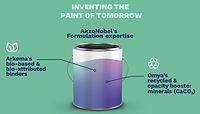CEO Alliance Backs EU Plan to Cut Carbon Emissions

AMSTERDAM — As the EU Commission prepares to present its Fit for 55 legislative package, the European CEO Alliance has issued policy recommendations supporting a progressive and ambitious push to achieve climate neutrality. Tackling climate change requires strong collaboration between the public sector and industry, the alliance announced after its meeting in Paris.
The Alliance would welcome a review of the EU’s major regulatory instruments, in particular subsidies for technologies with high CO2 emissions. The CEOs’ proposals include sending a strong carbon pricing signal, accelerating measures to decarbonize mobility and transport, buildings and energy systems, speeding up the renewal of key industry sectors in the EU.
"I am very pleased to have been able to exchange views today with the companies that provide solutions for the implementation of the Green Deal, the decarbonization of the economy, green transition and energy efficiency. As the European Commission prepares to present its ‘Fit for 55’ energy and climate package with measures to reduce greenhouse gas emissions by 55% in 2030 and achieve carbon neutrality in 2050, the mobilization of industrial and economic players will be essential to achieving our climate objectives together," said Clément Beaune, Secretary of State for European Affairs in the French government.
AkzoNobel CEO Thierry Vanlancker said, “Collaboration is key to fighting climate change, building economic resilience and ensuring that the EU Green Deal is a success. Through the European CEO Alliance, we’ll continue working together to accelerate the implementation of sustainable solutions and technologies within the buildings sector – one of several critical project areas. By transitioning towards carbon neutrality and helping to create more sustainable buildings, we can make a vital contribution and improve the places where we live and work. It’s not just about decarbonization, though. It’s also about health and well-being. As a company, we’re progressing well with ongoing efforts to cut our own carbon emissions in half by 2030. Today we can announce that we have accelerated and will have 100% renewable electricity in the EU already by 2022.”
As one central instrument, alliance members proposed a strong carbon price signal to achieve the EU’s climate targets, stating that carbon should have a price across the whole economy. The alliance also called for continued enhancement of the EU’s Emissions Trading System (for power and heavy industry) and for the implementation of sector-specific cap-and-trade systems that would apply to mobility, transport and the buildings sector. Sector-specific systems could then converge beginning in 2030. Another proposal concerns a European carbon pricing system that would include measures to simultaneously achieve a social balance and emissions reduction.
Decarbonizing mobility, transport and buildings will be the major challenges. The alliance reports that for the transport and mobility sector, electric mobility for passenger cars, light vehicles and heavy-duty vehicles has proven to be the most efficient technology in terms of energy consumption and emission reduction. To foster the entire ecosystem around electric mobility, members of the CEO Alliance have initiated cross-sector projects to ramp up battery production and create a charging infrastructure across Europe.
Turning its attention to the EU Commission’s Buildings Renovation Wave, the alliance supports ambitious renovation targets (of at least 3% p.a.) to accelerate the transformation of the building stock. Buildings should meet higher standards regarding energy efficiency, renewables and sustainable materials. The alliance also calls for fossil-fuel heating systems to be rapidly replaced by rolling out electric heat pumps, district heating and digital solutions. The CEOs are committed to applying this recommendation to their companies’ own buildings.
The European climate targets require a rapid build-up of renewable power generation and the direct electrification of mobility, transport and heating/air conditioning for buildings. The CEO Alliance is working on a project to integrate power systems, in particular grids, in order to create a system based mainly on renewables and flexible solutions.
The CEO Alliance for Europe's Recovery, Reform and Resilience was formed in 2020 against the backdrop of the COVID-19 pandemic and the historic European Green Deal. The alliance’s shared goal is to make the EU the world's leading region for climate protection while unlocking investments, fueling innovations in new technologies and creating future-proof jobs.
The members view themselves as an “action tank,” working together on cross-sector pan-European projects at scale: cross-EU charging infrastructure for heavy duty trucks, integration of EU power systems (in particular grids), digital carbon footprint tracking, sustainable and healthy buildings for the future of work and living, e-buses for Europe, green hydrogen value chains, and the rapid development of battery production. Further projects are being prepared, including one involving low-carbon steel. The CEOs will deliver their first tangible results and discuss implementation with high-level EU representatives at a summit set for autumn 2021.
The alliance brings together 12 top executives from the energy, transport and technology industries: Björn Rosengren (ABB), Thierry Vanlancker (AkzoNobel), Francesco Starace (ENEL), Leonhard Birnbaum (E.ON), Börje Ekholm (Ericsson), Henrik Henriksson (H2GreenSteel), Ignacio Galán (Iberdrola), Frans van Houten (Philips), Christian Klein (SAP), Christian Levin (Scania), Jean-Pascale Tricoire (Schneider Electric) and Herbert Diess (Volkswagen). McKinsey & Company is serving as a knowledge contributor for the CEO Alliance and is providing additional research and data.
Looking for a reprint of this article?
From high-res PDFs to custom plaques, order your copy today!






